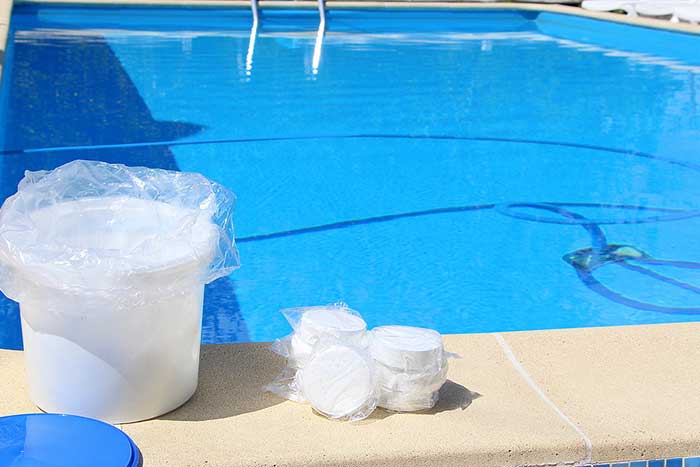We know the initial excitement that comes with getting a pool. You are thinking kids frolicking, morning swimming laps, and oh the many parties. But although you get to enjoy all these and even more, the sad reality soon hits you after the pool is finally filled up. It needs maintenance, lots and lots of it.
We aren’t even going to lie; having a pool can be tasking. There is the tendency of algae growing in it; it gets dirty from natural contaminants and debris. And don’t even get us started on skin cells from people swimming in it. Except properly maintained, pools can be a breeding ground for bacteria that can get your friends, family, and you sick.
The major solution for keeping pools safe is pool chemicals. And for a newbie, it may be quite a lot to take in. That is why this article is focused on explaining the very basis of pool chemicals.
Chemicals Needed For a Pool
The following are the basic chemicals used to keep pools clean and safe…
- Sanitizers
- Algaecides
- Hardness Balancers
- pH Balancers
- Alkalinity Balancers
- Pool shock
Now, let’s briefly discuss these chemicals in more detail.
1. Sanitizers
This chemical combines with viruses, algae, bacteria, and every other contaminant that is found in pools and then neutralizes them. Sanitizers are considered to be the most important chemical for pools. However, for it to work properly, every other chemical level must also be balanced.
There are two major or common types of pool sanitizers; bromine and chlorine. Chlorine attaches to viruses and bacteria and then neutralizes them by altering them chemically.
Bromine also works like chlorine; however, this is a better option for anyone with sensitivity to chlorine. A person that is sensitive to chlorine will get chlorine rash when they are exposed to this chemical. Visit https://www.medicalnewstoday.com/articles/323134 to learn more about chlorine rash. Bromine is mostly used for spas, hot tubs, and pools with warmer temperatures.
2. pH Balancers
This chemical helps to keep the pH range in pools healthy, making sure the overall functionality and health are okay. A lot of issues can occur if the pH level gets unbalanced; the swimmer’s eyes or skin can get irritated. The pH level can be very sensitive and can be affected by anything that comes in contact with it.
3. Alkalinity Balancers
These maintain an alkalinity range that will guarantee a great swimming experience. They also act as a shield or buffer for when the pool’s pH levels are unbalanced. When an alkalinity balancer is used in this way, it would first adjust the alkalinity level before letting the pH correct itself.
4. Algaecides
At some point, algae may break out. The obvious sign of an algae breakout is the color of the pool becoming a bit cloudy or green. Algae can cause skin infections and even injuries if a person slips on its slimy surface. You can learn more about this problem here.
This is where algaecides step in because they stop the growth of algae, ultimately preventing an algae outbreak. A lot of algaecides are copper chelates or sulfates based, which is what stops the growth of algae. However, there is a tendency for copper-based algaecides staining pools.
5. Pool shock
This chemical is used to clean up after the sanitizer has overworked and the remnants have to be removed.
You may need to super chlorinate or shock the pool when some specific events like a big party or a big rainstorm happen. You may also decide to carry out a shock once a week, ensure to use shock that does not have chlorine. This will remove bacteria while not shifting the chlorine levels.
6. Hardness Balancers
If you have ever heard of soft and hard water then this is the reason for it. How hard the water is usually based on the level of calcium found in it. It is also dependent on your location.
A very low calcium level can cause the pool’s system, plumbing, and equipment to corrode. A high calcium level on the other hand can damage the pool’s interior especially if it is a tile/mason or plaster one.
Either way, we believe you do not want to spend money replacing the pool’s expensive infrastructure just because you failed to monitor the hardness level. Use only the best pool chemicals test kit to check the chemical balance. And ensure you regularly check the “hardness” level so that you can properly maintain it.
Conclusion
As a pool owner, one of the major things you need to know about is the type of chemicals that are used to maintain pools. We believe we have given you the major points you need to be aware of in this article as we discussed the most important pool chemicals and their effects on pools.


